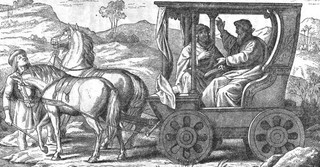Where Do We See Eunuchs in the Bible?
Share

Discussing eunuchs in the Bible may sound odd, but it has important insights for Christians having conversations about chastity, childbearing, and sexuality.
What Does It Mean to Be a Eunuch?
Dictionary.com defines a eunuch as a castrated man.
The Greek word eune means "bed," and the Greek word ekhein means "to hold or keep." Thus, a eunuch was a "bed keeper."
The term was used in ancient times when eunuchs were employed in palaces in the Middle East and China as harem guards and palace officials. In China, eunuchs were employees in the line of dynasties that lasted over 4,000 years into the twentieth century.
P.O. Scholz's book Eunuchs and Castrati: A Cultural History states that castrated men continue to serve in India and parts of the Middle East, as referenced in the Anthropological Science article "Skeletal effects of castration on two eunuchs of Ming China."
The tribes of Israel adopted the tradition of employing eunuchs in harems. Eunuchs' physical features did not threaten kept women.
Guard duty and military service were practical assignments for eunuchs since their skeletal remains studied in China have determined that eunuchs were taller than intact Chinese men. The height advantage is believed to result from castration before puberty, which causes delayed fusion of long bones and greater long-bone development. Records describe youthful eunuchs as having "bean pole" bodies with long arms and legs, narrow shoulders, wide hips, and a greater average height than their native populations. An adult male eunuch, however, gains fat readily and attains the rounded characteristics of a full feminine figure.
Why Did Many Societies in Bible Times Have Eunuchs?
Eunuchs are often cited as attendants and officials in Old Testament history books. Eunuchs relayed messages and assisted kings—such as the two or three eunuchs who threw Jezebel out an upper window for King Jehu (2 Kings 9:31-33). Kings also entrusted eunuchs to oversee royal property and livestock (I Chronicles 28:1) and fill military posts (2 Kings, chapters 23 and 24).
Because eunuchs could not impregnate women and were often regarded as feminine figures, rulers often made them administrators of harems. For example, in the book of Ester, the eunuch Hegai is a harem attendant who grooms Ester and other beautiful women competing for the role of queen.
While a large number of eunuchs are tacitly referred to as attendants in the Old Testament, Jesus' single reference to eunuchs in the New Testament passage beginning in Matthew 19:12 suggests that eunuchs played a role in Jewish culture to the end of the last century BC. The first-century historian Josephus wrote in Book XV and Book XVI of his exhaustive study of Jewish culture, Antiquities of the Jews, that eunuchs were important members of a royal Roman household, especially under Herod the Great, who ruled from 37 BC to 4 BC. He entrusted eunuchs to be his cupbearers—checking for poison, serving him supper, and putting him to bed. The eunuch who tucked him in bed also "managed the principal affairs of the government." Another eunuch attended to Herod the Great's favorite wife.
The Roman Castrati: Eunuchs in the Roman Empire by Shaun Tougher further documents the role of eunuchs in ancient Rome.
Why Does the Old Testament Say Eunuchs Could Not Enter the Lord's Assembly?
Deuteronomy 23:1 reads, "No one who has been emasculated by crushing or cutting may enter the assembly of the LORD."
As with many Old Testament laws, this one has an underlying message that the Jews must not follow the practices of their pagan neighbors. Self-mutilation was sometimes performed for a heathen god, and worshipping a false god was a serious wrong in the Jewish religion.
This law applied to humans worshipping their God, but it also applied to animal sacrifices. Leviticus 22:24 says, "You must not offer to the LORD an animal whose testicles are bruised, crushed, torn or cut. You must not do this in your own land." Ancient Jewish religion required a whole animal to be sacrificed in the temple.
Jews followed this law from the Torah and did not allow castrated men to participate in temple worship. Leviticus 21 lays out the specific laws a priest must follow to be worthy to serve God, including having a whole body without defect (Leviticus 20:20-21).
Who Are Some Famous Eunuchs Mentioned in Bible Stories?
Eunuchs play a part in the domestic intrigues of King Xerxes and Queen Vashti. While Queen Vashti is having a banquet with royal women in the palace, Xerxes sends seven eunuchs, described as "attendants" in Ester 1:12, to bring his Queen Vashti to be eye candy at his banquet. Xerxes is angry when Vashti does not heed the eunuchs' request. The king is also concerned that Vashti's behavior will set a premise for women's disobeying their husbands.
Looking to replace Queen Vashti, King Xerxes has a eunuch named Hegai—described as "the king's eunuch, who is in charge of the women" (Esther 2:3)—round up beautiful girls of the Persian citadel of Susa and brings them into the king's harem. Hegai cares for them with beauty treatments and special food. King Xerxes chooses the orphan Ester as his new queen from this pool of gorgeous women. Ester retains eunuchs as her attendants, according to the text in Ester 4:4.
Ashpenaz, a court official and most likely a eunuch, rounded up talented Hebrew men in Jerusalem for Nebuchadnezzar, King of Babylon, after Babylonian troops had seized Jerusalem. Daniel and his gifted friends were enlisted in service to the king, learning the Babylonian language and literature. These Hebrew, special court attendants received new names and likely new identities as eunuchs (Daniel 1:1-7). It was common practice then to castrate court members. The practice prevented the king from being cuckolded when his queen took an interest in an attendant. And without children, eunuch officials could not create their own dynasty and take over the king's court.
Another account of a eunuch occurs during the early Christian church days of the New Testament. The apostle Philip meets an Ethiopian eunuch seated in his chariot, studying the Bible. This nameless eunuch is identified as the official in charge of the treasury of Candace, queen of the Ethiopians. Philips explains Isaiah 53:7-8 to the Ethiopian:
"He was oppressed and afflicted, yet he did not open his mouth; he was led like a lamb to the slaughter, and as a sheep before its shearers is silent, so he did not open his mouth. By oppression and judgment he was taken away."
Jesus' sacrifice for peoples' sins and His life of persecution became real to the Ethiopian eunuch. He is baptized by Philip into God's family—to the eunuch's delight (Acts 8:26-39).
Where Does Jesus Talk about Eunuchs in the Bible?
Jesus described three types of eunuchs in Matthew 19:12. He says, "There are eunuchs who were born that way, and there are eunuchs who have been made eunuchs by others—and there are those who choose to live like eunuchs for the sake of the kingdom of heaven. The one who can accept this should accept it." In this short discussion, Jesus distinguishes between natural eunuchs born with reproductive organs with medical issues; eunuchs made so by others (castrated males); and men who choose to live like eunuchs (chastity).
Jesus advocates for living for the kingdom of heaven, mastering lust and its resulting evil deeds. In Matthew 18:8, Jesus tells his disciples, "If your hand or your foot causes you to stumble, cut it off and throw it away. It is better for you to enter life maimed or crippled than to have two hands or two feet and be thrown into eternal fire." If this also applies to castration to avoid sin, it is harsh counsel in any period. In Eastern Europe, members of the Christian Skoptzy sect (18th–early 20th century) underwent castration in response to this Bible passage. Various scholars have argued Jesus' words are deliberate exaggeration to make a point: eliminate situations or objects that regularly lead you into temptation.
The apostle Paul expanded on this conflict between the spiritual realm and "the flesh" with its sinful nature in Romans 8:5-6: "Those who live according to the flesh have their minds set on what the flesh desires; but those who live in accordance with the Spirit have their minds set on what the Spirit desires. The mind governed by the flesh is death, but the mind governed by the Spirit is life and peace." Rulers in ancient cultures up to judges of more recent history have sought to eliminate the physical natures of court attendants, soldiers, officials, and felons by making them eunuchs.
Jesus' and his apostle Paul's attitudes toward the abstinence of eunuchs are consistent with scripture from the prophet Isaiah:
"And let no eunuch complain, 'I am only a dry tree.' For this is what the LORD says: "To the eunuchs who keep my Sabbaths, who choose what pleases me and hold fast to my covenant—to them I will give within my temple and its walls a memorial and a name better than sons and daughters; I will give them an everlasting name that will endure forever." (Isaiah 56:3-5)
While the Bible talks about the value of having children and marrying, its words about eunuchs (people who literally cannot have children, people who practice chastity, perhaps people whose sexuality affects whether they can have children) tell us something important. Prophets, historians, apostles, and Jesus all remind us that eunuchs are part of God's family—useful and loved. God shows grace even to those we may think are outside his grace.
Photo Credit: Public domain photo via Wikimedia Commons

This article is part of our larger Spiritual Life resource meant to answer your questions about the Bible, God, and the Christian faith. Visit our most popular questions on “What does the Bible say about…” questions answered by well-known Christians and theologians to find more inspiration. Remember that as you read these articles, the Holy Spirit will give you understanding and discernment to make the right decision for your walk with Jesus Christ! If you know others struggling with these faith questions, please share and help others discover the truth on these controversial topics.